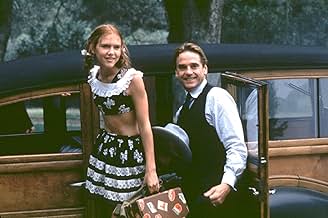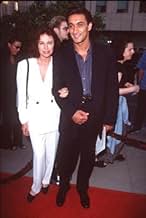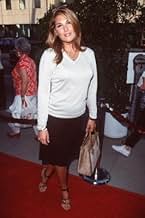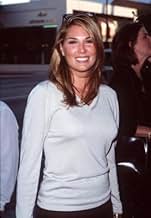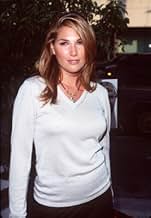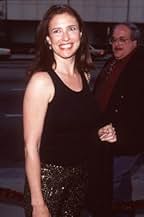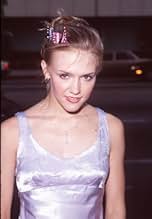Un homme se marie avec propriétaire afin qu'il puisse profiter de sa filleUn homme se marie avec propriétaire afin qu'il puisse profiter de sa filleUn homme se marie avec propriétaire afin qu'il puisse profiter de sa fille
- Director
- Writers
- Stars
- Prix
- 2 victoires et 4 nominations au total
Pat Pierre Perkins
- Louise
- (as Pat P. Perkins)
Emma Griffiths Malin
- Annabel Lee
- (as Emma Griffiths-Malin)
Avis en vedette
Briefly put, this film is a quite brilliant adaptation of the novel. While staying pretty faithful to the original source, Stephen Schiff's screenplay fleshes out the primary characters and their relationship, which plays out as a taboo but reserved love story. Maintaining the central themes, the plot is reduced to the essence of the major players and the linear events of the book. It's almost impossible to adapt a long book into the confines of a single average-length movie, but Schiff captures most of the important moments quite well and humanizes the characters who could have come off as bizarre depictions from Humbert's narrative.
Lyne's movie is at once haunting, compelling, and beautifully photographed. For all the controversy, it is a mature, reflective, and subtle film. "Lolita" is a challenging piece of work that sublimely reflects the pathos of the story and manages to retain bits of the complex humor of Nabokov. This "Lolita" abandons the notion of being a complete social satire and works as an essentially dramatic portrayal of a doomed, inappropriate romance that is ultimately a sad, tragic tale.
The performances are remarkable, especially those of Jeremy Irons and Dominique Swain. Irons is utterly perfect as the ill-fated wretch, Humbert Humbert. So understated but evocative with every move and gesture, he is the definitive Old-World European whose obsession bristles beneath his timorous demeanor. He evokes an incredible amount of sympathy for the character. Swain delivers an on-target portrayal of the flowering nymphet who toys with her burgeoning sexuality but hasn't overcome her fundamental brattiness. Swain elicits both allure and pity as the wayward character whose immaturity in mindset and behavior does not excuse her complicity in her affairs. Despite what some critics may have written, Melanie Griffith is fine in the small role as Lolita's overbearing mother. She is comically obtuse, and her veneer hits all the right, grating notes. Frank Langella rounds out the cast as the mysterious Quilty. He is appropriately shady, vague, and sinister when he appears from time to time, slowly revealing himself.
This is a real winner on many levels and should be up for several awards including best picture, director, actor, actress, and adapted screenplay. Showtime should be congratulated for its smart acquisition. I hope the movie finds its way to the largest possible audience.
Lyne's movie is at once haunting, compelling, and beautifully photographed. For all the controversy, it is a mature, reflective, and subtle film. "Lolita" is a challenging piece of work that sublimely reflects the pathos of the story and manages to retain bits of the complex humor of Nabokov. This "Lolita" abandons the notion of being a complete social satire and works as an essentially dramatic portrayal of a doomed, inappropriate romance that is ultimately a sad, tragic tale.
The performances are remarkable, especially those of Jeremy Irons and Dominique Swain. Irons is utterly perfect as the ill-fated wretch, Humbert Humbert. So understated but evocative with every move and gesture, he is the definitive Old-World European whose obsession bristles beneath his timorous demeanor. He evokes an incredible amount of sympathy for the character. Swain delivers an on-target portrayal of the flowering nymphet who toys with her burgeoning sexuality but hasn't overcome her fundamental brattiness. Swain elicits both allure and pity as the wayward character whose immaturity in mindset and behavior does not excuse her complicity in her affairs. Despite what some critics may have written, Melanie Griffith is fine in the small role as Lolita's overbearing mother. She is comically obtuse, and her veneer hits all the right, grating notes. Frank Langella rounds out the cast as the mysterious Quilty. He is appropriately shady, vague, and sinister when he appears from time to time, slowly revealing himself.
This is a real winner on many levels and should be up for several awards including best picture, director, actor, actress, and adapted screenplay. Showtime should be congratulated for its smart acquisition. I hope the movie finds its way to the largest possible audience.
Lyne's point of departure from the Kubrick version of Nabokov's great novel lies primarily in tone: the later version focuses more on the tragic, dramatic elements of the book and less on the comedic ones. I will not go so far as to suggest that Lyne made a better film; he did not. I do think, however, that he did pinpoint one of the key components of the novel's genius: a capturing of life on the newly paved highways of mid-century America. As Humbert, Jeremy Irons is as good as his predecessor James Mason. Frank Langella's interpretation of Quilty entirely diverges from the one given by Peter Sellers (and rightfully so; who wants to compete with Sellers?). But it is Dominique Swain, outdoing Sue Lyon, who comes closer than what ever seemed possible to embodying the essence of the doomed Dolly Haze.
I fell in love with Nabokov's masterpiece. Upon hearing that there was a movie adapted from the novel (I am of a younger generation) I found it hard to believe that anyone could put into visual images and dialogue what had appeared in my mind as flawless. After seeing this remade version, I came away satisfied. Hearing what countless critics had to say has never changed my view. Of course, it can never come even close to the novel, but watching Lyne's version unfold in quiet and somber light brought to mind the exact same feelings I was experiencing reading the book. Certain things did bother me. Lolita's mother in particular. Hearing Melanie Griffith deliver lines as if she were reading to a group of school children set my teeth on edge, although she went down in fine style. And having the sole reason for Humbert's obsession with nymphets wrapped up in one neat reason(Annabel) was also hard to swallow. But Dominique Swain was nearly the perfect picture of the Lolita in my mind. Wistful, vulnerable, and a fierce manipulator all at once, it's hard to believe she'd never had acting experience beforehand. Perhaps a bit too old in certain lights, she still managed to carry off a difficult role and steal every scene she was in, much like Natalie Portman in "Beautiful Girls". Certain expressions were incredibly poignant. (Think of Lo's face when Humbert denied permission to be in the play. Think of her lipstick smeared smile after being caught going out when Humbert went to the market). The essence of this movie is what formed my opinion that this was a good film. The pacing, the comparison to Kubrick didn't matter when the mood of the entire film was left. Maybe the critics are right, and I'm missing something. But when the final scene appeared, that dreamy image of Lolita's face, I was completely satisfied that Lyne did the best job anyone could have.
I implore you to read the book before watching the movie, and then you'll understand that it isn't glorifying anything. Yes the movie's aesthetic is beautiful. There are nice shots of the US and Lolita's style is pretty. But the story is nothing short of sick. Humbert is not meant to be the hero. He is an insanely sick and twisted. The author mocks him many times in the book. The story is told from his perspective which is interesting, but he is not a trustworthy narrator. He justifies his actions when in reality we see how they start to pile up on him and not work out in his favour. He is selfishly trying to pursue a fantasy, and putting adult expectations on a literal child. Lolita is manipulative, but she never stood a chance. She was failed by the adults around her. And she was dealing with a lot. Her father is nowhere to be found and we see how Humbert inserts himself into that role to abuse her. The aftermath of the characters, revealed right before the credits, is tragic. The actors delivered amazingly. And the poetic writing from the book is used throughout. This is a messed up story told from the perspective of a pathetic individual, but has elements of dark humour. We can see we are not supposed to root for Humbert. I think it was a great adaptation of the book.
Having read the book and watched the 1962 version some years back, now watching the 1997 version completes my own Lolita experience. This one also pretty well follows the novel but of course some things just are inappropriate to include. Lolita is a brat, sassy, pretty, flirty, manipulative, but Humbert is obsessed. Near the end, before his final encounter with Quilty he goes on about loving Lolita, but what he had was not love, it was carnal obsession. It wrecked him I suppose in the same way that many men have been wrecked over the history of the world.
I found it on Amazon streaming movies.
I found it on Amazon streaming movies.
Le saviez-vous
- AnecdotesAs Dominique Swain was a minor at age 15 when the movie was filmed, an adult body double had to be used for most of the sex scenes.
- GaffesCharlotte threatens to "ground" Lolita. Though the term was known to airmen it would not assume its current familiar meaning for many years.
- Citations
[first lines]
Humbert: [voiceover] She was Lo, plain Lo, in the morning, standing four feet ten in one sock. She was Lola in slacks, she was Dolly at school. She was Dolores on the dotted line. But in my arms she was always - Lolita. Light of my life, fire of my loins. My sin. My soul.
[whispered]
Humbert: Lolita.
- Générique farfeluAfter the credits are over there is a brief clip where Lolita is shown juggling a red apple.
- Autres versionsThe film was slightly cut to avoid a 'Not under 18' rating in Germany. An uncut version has been released on video.
Meilleurs choix
Connectez-vous pour évaluer et surveiller les recommandations personnalisées
- How long is Lolita?Propulsé par Alexa
Détails
Box-office
- Budget
- 62 000 000 $ US (estimation)
- Brut – États-Unis et Canada
- 1 071 255 $ US
- Fin de semaine d'ouverture – États-Unis et Canada
- 19 492 $ US
- 26 juill. 1998
- Brut – à l'échelle mondiale
- 1 071 255 $ US
- Durée2 heures 17 minutes
- Couleur
- Mixage
- Rapport de forme
- 1.85 : 1
Contribuer à cette page
Suggérer une modification ou ajouter du contenu manquant


